|
|
|
Sort Order |
|
|
|
Items / Page
|
|
|
|
|
|
|
| Srl | Item |
| 1 |
ID:
172850


|
|
|
|
|
| Summary/Abstract |
African countries have witnessed a significant decline in military coups since the 1990s, yet civil-military relations (CMRs) are still problematic and are further complicated by the episodic occurrence of military coups particularly since 2000. Since Ghana returned to multiparty politics in 1992, the country has won praise as one of the most successful examples of demilitarisation and democratisation. This paper examines the fundamental changes including norms influencing CMRs and lessons from Ghana’s experience. It argues that the state of Ghana’s CMRs has been a consequence of institutional change, norm diffusion, and changing attitudes of actors both in politics and civil-society. However, CMR bargain is fragile and uncertain because of the temptation by politicians to use the military for political ends including elections, to get ahead of their opponents.
|
|
|
|
|
|
|
|
|
|
|
|
|
|
|
|
| 2 |
ID:
172858
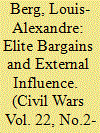

|
|
|
|
|
| Summary/Abstract |
This article explores how elite bargains affect external influence over civil-military relations. It argues that opportunities for security assistance arise from fragmented post-war coalitions and negotiations among rival factions. In post-civil war Liberia and Sierra Leone, the role of security assistance reflected bargains struck by ruling elites to consolidate their authority. Politicians used external backing to maintain fragmented coalitions while neutralising threats from factionalised armed forces. Reliance on security assistance enabled external influence through conditioning aid, delegated control, and day-to-day interaction. These cases highlight the importance of examining internal politics to explain the effects of security assistance.
|
|
|
|
|
|
|
|
|
|
|
|
|
|
|
|
| 3 |
ID:
172857


|
|
|
|
|
| Summary/Abstract |
African elites commonly recruit co-ethnic soldiers into state security institutions, a practice known as ethnic stacking. Ethnic stacking has recently received considerable attention from scholars and been linked to authoritarian repression, coups, and political violence. This article employs evidence from Sudan to argue that ethnic stacking is not one coherent tactic but several, and can manifest across multiple identities, multiple institutions, and at different points in the security force hierarchy. Moreover, the effects of ethnic stacking can be mediated by which institutions are stacked and whether stacking is restricted to the leadership or encompasses an entire security force.
|
|
|
|
|
|
|
|
|
|
|
|
|
|
|
|
| 4 |
ID:
172855
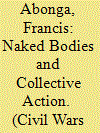

|
|
|
|
|
| Summary/Abstract |
How can citizens living under increasingly militarized and authoritarian regimes exercise political voice? Using an in-depth case study of naked protest in modern day Uganda, this article finds that naked bodies allow citizens to employ three types of overlapping power to confront a militarized authoritarian state: biopower, symbolic power, and cosmological power. The study illustrates one way in which citizens seek to engage militarized regimes—and in doing so, how political voice takes particular forms with limited capacity to instigate broader political claim-making that might be associated with country- or region-wide political action.
|
|
|
|
|
|
|
|
|
|
|
|
|
|
|
|
| 5 |
ID:
172852
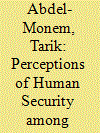

|
|
|
|
|
| Summary/Abstract |
Since 2004, close to 7,000 people have died in Thailand’s domestic insurgency in its three Muslim-majority southern provinces, one of the longest-running, low-intensity conflicts in Southeast Asia. This study assesses perceptions of human security threats in the area among a sample of students, their parents, and teachers of Islamic private schools (n = 427, n = 331, n = 51, respectively), and how they relate to perceptions of government actors and other community institutions. Questionnaire items were drawn from the World Values Survey Wave 6. Focus groups and interviews were also conducted to deepen our understanding of conflict related dynamics.
|
|
|
|
|
|
|
|
|
|
|
|
|
|
|
|
| 6 |
ID:
172848


|
|
|
|
|
| Summary/Abstract |
Problems of civil-military relations have been at the centre of recurring political crises in contemporary Africa. Routine military intrusion in politics characterised the first four decades of independent Africa. Citizens suffered at the hands of the armed forces, infamous for widespread human rights violations. One key response to this dual civil-military problem was to pursue a strategy of politicising the armed forces in order to make them a) subordinate to civilian authority and b) organically close to the public and protective than predatory. This also entailed the militarisation of politics ostensibly to bring the political class into closer conversation and collaboration with the military. To what extent did this strategy contribute to transforming civil-military relations? Taking the Ugandan case, this article argues that transformation was attained in making the military more respectful of citizens’ rights while simultaneously creating a fusion with the ruling class thereby subverting the very goal of professionalism.
|
|
|
|
|
|
|
|
|
|
|
|
|
|
|
|
| 7 |
ID:
172849


|
|
|
|
|
| Summary/Abstract |
When he came to power in 1986, Uganda’s President Yoweri Museveni promised to establish a professional, disciplined and all-inclusive national army. More than three decades later, the Ugandan army under his leadership has constantly been entangled in record corruption scandals. Based on extensive field research, this article explores the nature of corruption in Uganda’s defence sector and shows how corruption is tolerated and sometimes encouraged by the regime leader because it serves as an instrument of political control. The article highlights pervasive corruption in the Ugandan army, the political use of corruption by the regime and the impact it has had more generally.
|
|
|
|
|
|
|
|
|
|
|
|
|
|
|
|
| 8 |
ID:
172854


|
|
|
|
|
| Summary/Abstract |
Relations between African militaries, civilian authority and the public have undergone significant transformation over the past decades. Much of previous scholarship on civil-military relations tended to approach the subject through the idiom of the coup. Analysts in the 1960s initially presented the military in positive terms as a modernising agent, a representation cast aside in the throes of coups d’état, instability and rights violations at the behest of armed forces. This article revisits the conceptual and theoretical terrain in light of recent socio-political changes and in the wake of the peak of military coups on the continent. In reconceptualising civil-military relations, this article proposes a typology that combines the nature of modal relations with civilian authority and relations with the civilian public. The article analyses the different models of relations, tracing the domestic reconfigurations and external influences that structure news ways of civil-military engagement.
|
|
|
|
|
|
|
|
|
|
|
|
|
|
|
|
| 9 |
ID:
172853


|
|
|
|
|
| Summary/Abstract |
The military is a central component of the state and society with implications for statehood and social stability. Since independence, Africa has grappled with contentious and contradictory roles of armed forces whether they be part of or against the state. Much of the early scholarship on the role of the military tended to paint a positive picture, presenting it as a critical pillar and an agent of modernisation for the newly independent states. This was to change drastically in the era of routine and rampant coups d’états and proliferation of organised rebel activities. But the continent has undergone significant changes since the end of the Cold War. This introduction highlights some of the major changes at the centre of transformations in relations between African militaries and civilian authorities and the public. The overall focus of the introduction, and the entire special issue, is to reposition the theoretical and conceptual aperture for analysing civil-military relations in Africa.
|
|
|
|
|
|
|
|
|
|
|
|
|
|
|
|
| 10 |
ID:
172851
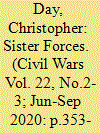

|
|
|
|
|
| Summary/Abstract |
In many African states, park rangers perform a variety of roles as armed state actors. Facing the overlapping challenges of wildlife management and regime security, many have become increasingly militarized, with significant degree of variation. Using case studies from Uganda, Rwanda, Democratic Republic of Congo, and South Sudan, this article provides an expanded conceptualization of militarization that configures two characteristics of Africa’s park rangers: 1) their integration into or insulation from the state security apparatus, and 2) their coercive roles of either law enforcement or combat. The article builds an argument that takes into account colonial institutions and civil-military relations.
|
|
|
|
|
|
|
|
|
|
|
|
|
|
|
|
| 11 |
ID:
172856
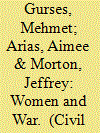

|
|
|
|
|
| Summary/Abstract |
To what extent do women’s rights change in a post-civil war society, and what explains these changes? To address these questions, a number of studies emphasise the disruptions to daily home, work, and community environments brought about by the dynamics of conflict. While war is disruptive and has the potential to generate new opportunities for women, we argue that conflict alone fails to explain variations in women’s rights. Using a cross-sectional dataset, we examine the insurgent group’s political ideology as a central explanatory factor for changes in women’s rights in the aftermath of civil war. Results from a series of regression analyses show that while wartime dynamics help improve women’s political rights, this is not necessarily the case when it comes to women’s economic and social rights. These results demonstrate the need to account for the insurgent group’s political ideology in examining the change to women’s rights in the context of armed conflict.
|
|
|
|
|
|
|
|
|
|
|
|
|
|
|
|
|
|
|
|
|